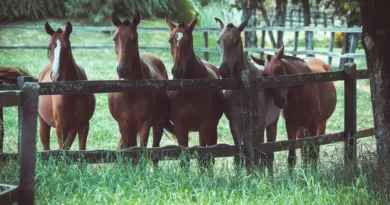How Often Should You Worm a Horse
Understanding Equine Parasites
Equine parasites are a common concern among horse owners, as they can cause numerous health issues and affect a horse’s overall well-being. These parasites are organisms that live and depend on the host horse for their survival. They can be found in various areas of the horse’s body, including the digestive tract, lungs, and skin.
The most common types of equine parasites include roundworms, tapeworms, bots, and small strongyles. Each type of parasite may cause a range of symptoms and complications, from gastrointestinal disturbances to weight loss and even colic. Understanding the life cycles, transmission methods, and potential damages caused by these parasites is crucial for effective prevention and treatment strategies. Regular deworming, appropriate medication, and proper management practices play key roles in minimizing the risk of parasite infestations in horses.
Common Types of Horse Worms
There are several common types of worms that can affect horses, each with its own distinct characteristics and potential risks. One of the most well-known horse worms is the large strongyles, also known as bloodworms. These worms reside in the large intestines and can cause severe damage to the horse’s blood vessels, leading to potential complications like colic and even death if left untreated. Another common type is the small strongyles, which can form cysts in the intestinal wall and cause chronic diarrhea, weight loss, and decreased performance in the horse.
Additionally, roundworms, or ascarids, are another prevalent type of horse worms, particularly in young horses. These worms can cause digestive disturbances, poor growth, and even blockages in the intestines if left uncontrolled. Another significant type is the tapeworms, which can attach themselves to the horse’s intestines and cause irritation and discomfort. While tapeworm infestations are usually less severe, they can still contribute to colic and other digestive issues in the horse.
Understanding the common types of horse worms is crucial for horse owners and caretakers to effectively combat these parasites. By identifying the signs of a worm infestation and implementing an appropriate deworming schedule, horse owners can protect their horses’ health and maintain optimal conditions for their well-being.
Factors Affecting the Frequency of Deworming
One crucial factor that affects the frequency of deworming in horses is their age. Younger horses, especially those under the age of two, are more susceptible to worm infections and may require more frequent deworming. This is because their immune systems are still developing, making them more vulnerable to parasites. As horses age and their immune systems strengthen, the frequency of deworming can be reduced.
Another factor to consider is the horse’s environment. Horses kept in a crowded or unsanitary environment are at a higher risk of parasite infestation and may require more frequent deworming. This is because parasites thrive in such conditions and can easily spread from horse to horse. On the other hand, horses kept in clean and well-maintained pastures, with proper manure management, may have a lower risk and thus require less frequent deworming.
Signs of a Worm Infestation in Horses
Parasitic infections in horses can have a detrimental impact on their overall health and well-being. Recognizing the signs of a worm infestation is crucial in order to provide timely treatment and prevent further complications. Keep a close eye on your horse for any noticeable changes in their behavior or physical appearance.
One of the most common indicators of a worm infestation in horses is weight loss or poor body condition despite a proper diet. However, it’s important to note that weight loss can be caused by various factors, so it’s essential to consider other symptoms in conjunction. Other signs to watch for include a dull or rough coat, persistent diarrhea, the presence of worms in the horse’s feces, and changes in appetite. Additionally, horses with a high worm burden may experience colic-like symptoms, such as abdominal pain, bloating, or discomfort. Regularly monitoring your horse’s health and promptly addressing any concerns with your veterinarian is paramount in maintaining their well-being.
Consultation with a Veterinarian
The guidance and expertise of a veterinarian should never be underestimated when it comes to managing equine parasites. An experienced veterinarian can provide invaluable advice and information tailored to the individual needs of your horse. Through a thorough examination, they can identify any signs of a worm infestation and recommend the most effective treatment options. Additionally, they can help develop a deworming schedule that takes into account various factors such as the horse’s age, environment, and overall health. By consulting with a veterinarian, you can ensure that your horse receives the appropriate care and protection against parasites.
It is important to remember that each horse is unique, and what works for one may not necessarily work for another. Consulting with a veterinarian can help address specific concerns and conditions that may require a tailored approach. They can also provide guidance on different worming methods and products available on the market, helping you make informed decisions based on the specific needs of your horse. Regular check-ups and discussions with a veterinarian will not only help monitor the effectiveness of the deworming program but also provide a platform for ongoing advice and support for maintaining good horse health.
Developing a Deworming Schedule
Developing a deworming schedule is an essential aspect of maintaining the overall health and well-being of horses. The frequency of deworming depends on various factors, including the horse’s age, environment, and exposure to parasites. Younger horses, such as foals and weanlings, are particularly susceptible to worms and often require more frequent deworming. It is recommended to consult with a veterinarian to determine a suitable deworming schedule based on the individual horse’s needs and circumstances.
When developing a deworming schedule, it is crucial to consider the specific types of parasites prevalent in the horse’s geographic location. Different regions may have varying levels of parasite infestation, and the deworming plan should be tailored accordingly. Regular monitoring and evaluation of the effectiveness of the deworming protocol are also vital to ensure its continued success. By adhering to a carefully planned deworming schedule, horse owners can effectively control and minimize the risks associated with internal parasites, promoting optimal health and performance in their equine companions.
Different Worming Methods and Products
There are various methods and products available for deworming horses, each with its own advantages and considerations. One commonly used method is administering oral dewormers, which come in the form of paste or gel. These are easy to administer and can be effective against a variety of worms. Another option is using feed-through dewormers, which are added to the horse’s daily feed. This method involves the horse ingesting the dewormer, and as the worms pass through their digestive system, they are eliminated. However, it is important to note that this method may not be as effective against all types of worms.
Injectable dewormers are also available and are administered through a syringe. This method is often used for specific types of worms that are more resistant to other forms of treatment. Additionally, there are deworming pellets that can be mixed with the horse’s feed. These pellets contain the dewormer and are easy to distribute evenly throughout the feed. However, it is important to carefully follow the instructions for dosage and administration with these products. It is advisable to consult with a veterinarian to determine the most appropriate method and product for your horse’s specific needs.
Monitoring the Effectiveness of Deworming
After deworming your horse, it is important to monitor the effectiveness of the treatment to ensure that the parasites have indeed been eliminated. One way to do this is through regular fecal egg counts. A fecal egg count involves collecting a fresh stool sample and sending it to a laboratory for analysis. The lab will examine the sample under a microscope and determine the number of parasite eggs present. By performing fecal egg counts at regular intervals, you can assess the effectiveness of the deworming program and make adjustments if necessary.
Another method for monitoring the effectiveness of deworming is by assessing the overall health and condition of your horse. If your horse continues to show signs of poor appetite, weight loss, or a dull coat despite regular deworming, it may indicate that the treatment is not effectively controlling the parasite burden. In such cases, it is crucial to consult with your veterinarian for a thorough evaluation and to determine if a different deworming strategy is needed. Monitoring the effectiveness of deworming is essential to ensure that your horse remains healthy and free from the harmful effects of parasites.
Seasonal Considerations for Deworming
Spring, summer, fall, and winter all bring their own unique considerations when it comes to deworming your horses. In the spring, it is especially important to address the issue of encysted small strongyles. These parasites tend to accumulate in the horse’s intestines over the winter months and can cause significant health issues if not treated promptly. Many veterinarians recommend administering a specific dewormer that targets these encysted larvae during the springtime.
As the weather warms up in the summer, fly populations increase, and so does the risk of horses becoming infested with worms through ingestion of contaminated grass or water. Regular deworming during this season helps to keep these parasites at bay and minimize the risk of worm-related health problems. Additionally, it is crucial to maintain clean and hygienic stable environments to further reduce the chances of worm infestations.
Overall, adapting your deworming strategy to the changing seasons is essential for maintaining the health of your horses. By considering the specific parasites prevalent during each time of year and tailoring your deworming schedule accordingly, you can effectively protect your horses and ensure their overall well-being throughout the year.
Maintaining Good Horse Health through Regular Deworming
Maintaining good horse health through regular deworming is essential for ensuring the well-being of these magnificent animals. Parasites can cause a range of problems in horses, including weight loss, dull coat, poor appetite, and even more serious health issues. By implementing a consistent deworming program, horse owners can effectively combat these parasites and promote the overall health and vitality of their equine companions.
Regular deworming helps to control the population of internal parasites in horses. These parasites, such as strongyles, roundworms, and tapeworms, can not only cause discomfort and digestive disturbances but can also lead to serious complications if left untreated. By following a comprehensive deworming schedule, horse owners can reduce the risk of infestations and keep their horses in optimal health. It is important to consult with a veterinarian to determine the most appropriate deworming products and methods for your horse, as individual needs may vary. By proactively addressing any signs of a worm infestation and monitoring the effectiveness of deworming treatments, horse owners can help maintain good horse health and ensure the well-being of their equine companions.
What are equine parasites?
Equine parasites are organisms that live in or on horses and can cause harm to their health. They include various types of worms, such as roundworms, tapeworms, and strongyles.
How do horses get infected with worms?
Horses can become infected with worms by ingesting larvae or eggs that are present in contaminated food, water, or pasture. They can also pick up worms from other horses or from their own environment.
What are the common types of horse worms?
The common types of horse worms include roundworms, tapeworms, strongyles, pinworms, and bots.
How often should I deworm my horse?
The frequency of deworming depends on various factors, such as the horse’s age, environment, and exposure to other horses. It is recommended to consult with a veterinarian to determine the appropriate deworming schedule for your horse.
What are the signs of a worm infestation in horses?
Signs of a worm infestation in horses can vary, but common symptoms include weight loss, poor appetite, dull coat, diarrhea, colic, coughing, and a potbelly appearance.
Why is it important to consult with a veterinarian?
Consulting with a veterinarian is important because they can assess your horse’s specific needs, perform fecal egg counts to determine the type and level of infestation, and recommend the most suitable deworming products and schedule.
How do I develop a deworming schedule for my horse?
You can develop a deworming schedule for your horse by considering factors such as their age, exposure to other horses, and the local climate. Your veterinarian can provide guidance in creating a customized plan.
What are the different methods and products for deworming horses?
Different methods of deworming include oral paste, feed additives, and medicated feed. There are various deworming products available, such as ivermectin, moxidectin, fenbendazole, and pyrantel pamoate.
How can I monitor the effectiveness of deworming?
Fecal egg counts can be done before and after deworming to assess the effectiveness. This helps determine if the deworming treatment was successful and if additional deworming is necessary.
Are there any seasonal considerations for deworming?
Yes, seasonal considerations for deworming include targeting specific parasites during certain times of the year and adjusting the deworming schedule based on factors like grazing patterns and climate.
How does regular deworming maintain good horse health?
Regular deworming helps control and prevent the harmful effects of parasites in horses. By keeping the parasite population in check, horses can maintain better overall health, digestion, and immunity.




